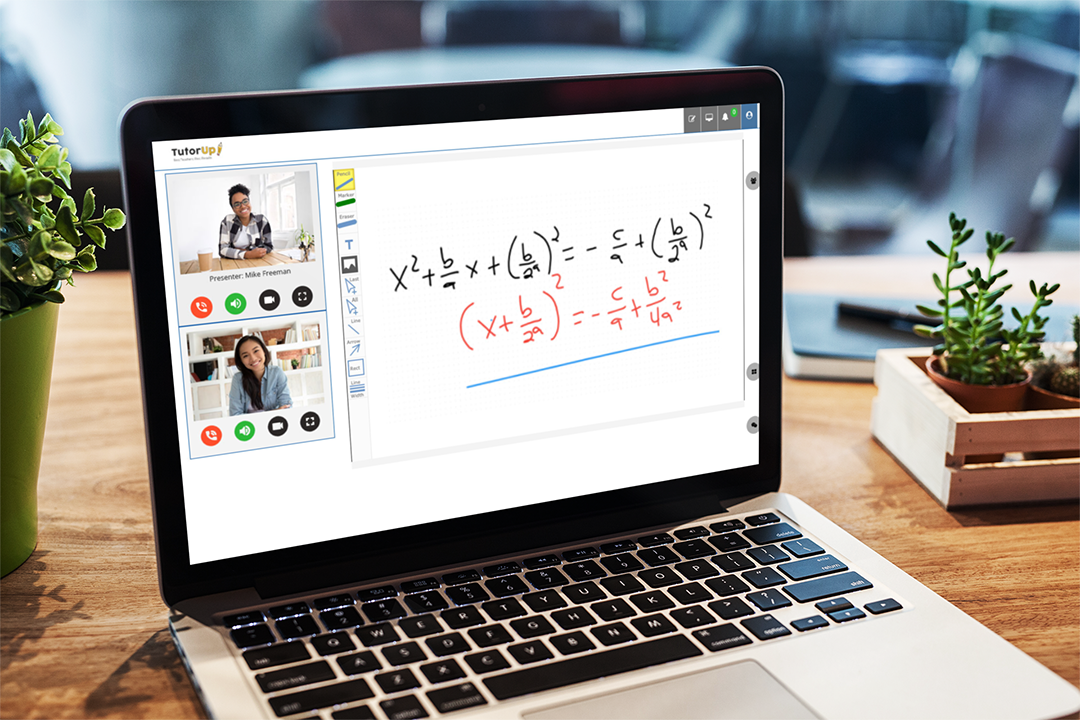
by TutorUp | Aug 18, 2020 | Parents and Family Life
updated – July 2021
We know how frustrating it can be to try to find an expert tutor for an in-demand subject area like math. With some tutoring services, math tutors know they can charge a premium for their skills. This leads to hourly rates for in-person sessions that can soar as high as $200 an hour!
Tutoring should be simple and affordable. For example, at TutorUp, we only work with certified, experienced teachers who know the curriculum standards. Not only are these teachers subject-area experts, but they’re passionate educators — not entrepreneurs out to make a quick buck.
To understand the true costs of working with a licensed professional, read on as we separate the fact from the fiction. Despite what other sites may say, math tutors are much more affordable than you think.
Here’s a closer look at the true cost of math tutoring:
Myth #1: Math Tutors in Urban Areas Charge More
You’ve heard the horror stories. Parents who want to give their students an edge in prep courses or standardized tests spend up to $200 an hour to hire tutors for in-demand subjects like math — especially in major cities like New York and Washington, D.C. At TutorUp, your geographic location does not affect the cost of tutoring.
At TutorUp, our tutors are experienced teachers — not salespeople. They already have deep knowledge in their subject area, as well as the pedagogical training they need to help your student succeed. No matter what grade level your student is in, we can connect you with a tutor who can meet your student right where they are.
When it comes down to it, math tutoring is just like any other subject. You need a knowledgeable, licensed educator who can forge an instant connection with your student and teach the material from your local school district with passion, at a rate your family can afford.
Myth #2: Math Tutors Who Work for Tutoring Services Tack on Fees
Other tutoring services that offer subject-area help typically take between 40-70% of a tutor’s fee as an ongoing commission. This incentivizes tutors who are in high demand, like math and science tutors, to charge more in order to recoup their losses.
At TutorUp, we want to connect you with the very best tutors for your child’s needs. There are no extra fees, and the cost of an hourlong session is based on grade level, and whether the session takes place online or in person. Price ranges from $45 per hour to $65 per hour. When you buy a package with multiple sessions, you can save up to 25%.
TutorUp Math Tutors all Grades
Single 30-minute session online $29
New Student Special Offer! Buy 3 sessions, get a 4th session free! Only $79
Call 877-888-6787 – ask about our package pricing and subscriptions
Myth #3: Math Tutors Charge More Than Tutoring Other Subjects
Not all tutoring services necessarily work with credentialed teachers. As a parent, you might be saving money by choosing an unlicensed math tutor, but you could be sacrificing quality in instruction, too. But our math tutors cost the same as tutors in any other subject.
Also, our online tutors are the same experienced teachers who provide our in-person tutoring. And your tutoring sessions are one-on-one, so your child gets the same personalized attention whether it’s online or in person. We do charge an additional $5 per hour for in-person sessions, to compensate the tutor for travel. That $5 goes directly to the tutor.
When you choose in-person tutoring, we connect you with a tutor who lives nearby, and your student gets the benefit of working with local, passionate teachers who know what it takes to work with students individually, and they’re ready to work with your student at a rate that makes sense for you and your family. TutorUp has found a better way to connect parents with licensed teachers in their area who can tutor their students for an affordable rate, whether in person or online.
Myth #4: Math Tutors Personalize Lessons at a Premium
Just because some entrepreneurial math tutors command a premium for personalized lessons and in-person instruction, we’ve been conditioned to think these are rare skills. But they’re exactly what your student’s teacher already knows how to do! And that’s why we work with experienced teachers. All of our tutors personalize lessons, and it’s included in the cost, not an extra charge.
Maybe your student is a visual learner who needs help plotting a graph. Or maybe your student is a hands-on learner who would rather learn about volume and area by making a miniature model of your city. When a math tutor sees what a student needs by working together, they can customize their instruction methods to meet your student where he or she is at — and keep building on the momentum of each lesson.
Whatever your student needs, personalized teaching can lead directly to the “ah-ha” moments that make for more successful learning. And it doesn’t have to cost a premium.

by TutorUp | May 8, 2020 | Online Tutoring
The entire world is learning a new way of interacting as we practice “social distancing” along with a newfound enthusiasm for frequent handwashing. We are all hopeful that in-person get-togethers will soon return, but in the meantime, as much interaction as possible is moving online.
In keeping with that, TutorUp has just launched online tutoring services so that our students can continue learning while staying home, and our teachers can work from home, observing best health safety recommendations. Our online platform includes video, audio, a shared whiteboard, messaging, and document sharing.
We are proud of the services we provide that set TutorUp apart from other tutoring service companies, including our foundational service which is in-person, one-on-one tutoring provided by local certified teachers. During the coronavirus outbreak, we have made online tutoring available as an alternative to allow your students to stay SAFE as they continue their learning.
Our Tutors are all Certified Teachers
Our new online tutoring provides the exact same quality service our parents and students expect. All of our tutors are experienced, background-checked teachers, and they are still able to work with students in private, one-on-one tutoring sessions. Moving online has given us the ability to serve a much larger audience, and we are finding that many parents welcome the help as they struggle to keep their children from losing ground academically while home in isolation.
Schools are doing their best to continue to keep students engaged, but the reality is that most are just not equipped to deliver their normal curriculum in an online format. Many students still find that they need some one-on-one instruction, and parents are concerned about how difficult things might be in the fall when school resumes.
Online tutoring is convenient and flexible, and doesn’t require our teachers to travel, so we are passing on that savings to our parents and students. Contact TutorUp today to find out about online tutoring and how to get your student signed up for safe, high-quality, affordable tutoring sessions with one of our experienced teacher/tutors.

by TutorUp | May 1, 2020 | Parents and Family Life
There’s no doubt about it – tutoring works. And, according to a recent study conducted at Johns Hopkins University, one-on-one attention from a teaching assistant or paraprofessional improved students’ performance in the classroom even more than rigorous classroom instruction.
But just because your student receives one-on-one instruction doesn’t mean their test scores will automatically shoot up. To see improvement, you need instruction from a qualified educator who is willing to set realistic, meaningful learning objectives for tutoring time – and who will encourage your student to move past frustration and toward content mastery.
Like any parent, you want to make sure your student receives the best possible instruction. That’s why, at TutorUp, we seek the most qualified teachers who want to tutor your student. They know how to adapt their tutoring styles to individual student needs.
Here are 8 signs you can look for to determine whether your child’s tutor is teaching effectively.
Your tutor sets goals with you
A great educator works from a baseline, observing how a student performs without any intervention and then helps them improve from there. An effective tutor will work closely with you to choose reasonable tutoring goals for your student. You want someone who can meet your student where they’re at right now, and who can consider how to help them level up in their learning, too.
Higher test scores and better course grades are often the aim of tutoring, but make sure you’re seeking improvement relative to your student’s abilities. Too much pressure, and your student could wind up feeling frustrated with their performance – even if their grades do improve!
And don’t forget to consider other, less tangible factors, like increased participation in the classroom, improved focus, or increased feelings of confidence around homework, classwork, and testing. As your student works with their tutor, you should see improvements across each of these areas.
Your tutor uses teacher comments and student feedback to adjust their lessons
Good tutors are flexible, using all the information and resources at their disposal to reach any given student. At TutorUp, we help you put your tutor in contact with your student’s teacher, so the educators in your student’s life are on the same page. If your tutor regularly considers teacher feedback in how they structure their lessons, you know you have a great tutor on your hands.
Student feedback matters, too. Extra homework help isn’t always fun, but tutors can respond to student feedback in various ways to make tutoring sessions lively, engaging, and supportive. Does your tutor change the kind of work they tackle in each session? Have they thought about how your student learns? Do they create a positive atmosphere? Does your student want to sit down with your tutor, even if the work is sometimes difficult?
Your tutor balances positive feedback with clear expectations for work
Students can experience a lot of shame around needing extra homework help, which is why it’s so important for your tutor to make tutoring sessions feel positive and engaging – even when there’s lots of work to be done.
Choose someone who encourages your student as they meet the challenges of individual assignments, but who isn’t willing to let the lesson go out the window if your student balks at the workload. Students need a balance of positive feedback and encouragement with clear expectations about work, so they’re motivated to keep going – even when the going gets tough.
Your tutor starts to take a back seat during tutoring sessions
One-on-one attention for struggling students is invaluable. But it’s also important for students to learn independence in their quest to find the right answers.
If your tutor lets your student figure out content on their own, you can feel good about all the study skills your student is picking up as they work toward content mastery.
You should take note of how your tutor encourages your student to problem-solve, ask questions, read critically, and follow directions. These are invaluable study skills that translate directly to the classroom, including homework time and test-taking skills.
Signs to look for in your student
Your student receives better test scores or grades
Better test scores and grades can be good indicators of whether or not your student has an improved understanding of content with the help of a tutor. But often, improvement in school is because a student’s confidence shoots up, or they’ve learned better study skills from their tutor that help with test-taking or independent classwork.
While your student’s test scores and grades should be celebrated as they improve, make sure to check in with your student’s teacher to see what classroom behaviors have also changed.
Give even more praise for positive indicators like increased participation, classroom leadership, focus, and collaboration so your student knows they’re on the right track.
Your student stops dreading homework time
If homework time at your house is hard, it might be because your student struggles with where to begin – or doesn’t feel confident in their ability to complete work once they do.
One-on-one tutoring sessions with a licensed teacher can help with both of these hurdles. Not only do students learn how to break down homework prompts into manageable chunks during tutoring sessions, but they also get more practice with the content, which leads to feeling more secure in the classroom.
You should start to notice that your student stops dreading homework time or independent projects because they now have new skills – and more confidence – for tackling problem sets and essay prompts all on their own.
Your student receives positive feedback from their teacher
Students who struggle in school do so for all sorts of reasons: frustration, misunderstanding, lack of focus, and poor self-confidence among them.
In the classroom, teachers do their best to make sure as many students as possible understand the material. But some students might just need more attention to cross the finish line, and will feel frustrated or withdrawn in class until they get that extra attention.
One-on-one tutoring can make the difference, giving your student more time to process material, learn study strategies, and feel more confident in their abilities. As your student masters content with your tutor, your student’s teacher should also notice changes in the classroom, like improved participation or focus.
Check in with your teacher to see what changes in behavior they’ve noticed — and ask whether they have any additional suggestions for tactics you can try at home.
Your student can do more work on their own
It’s one thing for a student to master content with the help of a licensed teacher in one-on-one sessions. But it’s quite another for your student to learn the skills and strategies they need to be self-directed learners.
Observe tutoring sessions to see whether your student asks more questions, tries different problem-solving methods, reads critically, and picks apart homework prompts or directions to understand the task in front of them. Your tutor should encourage these strategies – not just hold your student’s hand or be a friendly “study buddy.”
If you notice that your student is using more study strategies – and, in the process, answering more math problems correctly or writing essays with better organization – then you know their one-on-one tutoring sessions have been effective.

by TutorUp | Apr 24, 2020 | Parents and Family Life
Helping your child who is struggling with schoolwork can be stressful. As a parent, it’s also hard to know when a bad test score is just a blip, and when your child needs help from a trained educator to address an area of concern. At TutorUp, we only hire certified teachers who know how to assess problem areas and teach students the fundamental concepts they need to be successful in the classroom. As professional educators, our tutors know how to make learning more fun – and how to address issues like lack of concentration or motivation that make learning more challenging for some students.
Wondering whether a tutor can help your child? Here are 6 common learning challenges tutors know how to address
1. Difficulty understanding foundational concepts
For most parents, a sustained pattern of bad grades is one of the first signs that their child needs a tutor. But what does this pattern really tell you about what’s going on with your child at school?
Begin by scheduling a time to chat with your child’s teacher, so you can better understand the scope of the problem. Has your child misunderstood fundamental skills that would help them tackle complicated math concepts? Are they struggling with study skills, like memorization or reading directions?
If more study sessions don’t help your child’s schoolwork improve, one-on-one tutoring might be the answer. At TutorUp, we only hire certified, experienced teachers. These subject-matter experts know how to break down fundamental concepts and personalize lessons to give your child the focused instruction they need to succeed.
With your tutor, establish reasonable session goals to address your child’s learning style and specific needs. One-on-one attention and personalized lessons can help struggling students achieve the “ah-ha” moments that lead to real learning – and improved classroom performance.
2. Emotional distress and performance anxiety
While slipping grades can simply be a sign that course material is getting harder, low grades can also signal anxiety, stress, and even depression, says Dr. Claire McCarthy. That’s because depression in teens often looks different than it does in adults – and slipping grades can be a telltale sign of a more serious problem.
This could include “learning disabilities, ADHD, bullying, [or] substance use,” writes McCarthy at Harvard University’s health blog. “But whenever a child’s grades are dropping, it’s important to think about depression as a possible cause.”
Together with your child’s teacher, unpack any signs of troubled behavior at school and home in order to address potential mental health issues. Whether your child is simply stuck on a new concept or there’s something more serious at work, a parent-teacher conference is the best first step to take when grades start to drop.
In addition to classroom and appropriate professional support, after-school tutoring from a certified educator can help students become more confident in their abilities as they work through other issues.
By giving your child the study skills needed to find answers on her own, solve problems, and work independently, a tutor’s positive reinforcement will make a big difference in your child’s academic success.
3. A lack of focus at school or home
Does your student have difficulty following their teacher’s lectures, staying on task during independent reading and study hours, or finishing their work?
They might be struggling with self-esteem, anxiety, or lack of motivation, which could be making their work unfocused. While it’s best to work with your child’s teacher to discover the underlying cause, one-on-one tutoring can often help students develop more confidence in their abilities, which leads to improved classroom performance.
Occasionally unfocused work is the result of a more serious learning or attention disorder. Students diagnosed with attention disorders sometimes experience bouts of unproductivity because they have a different learning style, suggests Adrian Ridner, the founder of Study.com.
“The traditional classroom setting and conventional teaching methods are often not a great fit for students with ADHD so, naturally, many struggle to keep up and maintain good grades,” Ridner explained to U.S. News & World Report. “For those with ADHD, [a learning style preference] is of utmost importance.”
One-on-one tutoring can be especially beneficial for students with attention disorders, who need trained educators to take the time to explore visual, auditory, or tactile learning aids. If your child has an IEP, their classroom teacher is required to use these learning methods, too.
Together, your child’s classroom teacher and tutor can unlock the learning styles that help your child focus and retain material.
4. Disruptive behavior
When students are frustrated, stressed out, and discouraged by school work, they can disrupt others in the classroom. This can look like anything from talking back to their teacher to distracting their friends and seat mates from completing work.
Talk with your child about their behavior, and work together to find solutions that ease any anxieties or fears, suggests parenting expert Laura Flynn McCarthy. It’s also important to make time to discuss your child’s behavior with their teacher, who likely has insights into the root causes of their behavior.
If your child has been diagnosed with an attention disorder, learning disorder, autism, or other special needs, behavioral issues could be a sign of frustration or confusion in the classroom. Students with learning disabilities or attention disorders can receive the extra emotional and academic support they need to be more successful in the classroom from one-on-one sessions with a trained tutor.
One-on-one attention from a tutor isn’t a magic bandage for bad behavior in the classroom. But tutoring can help your child gain more confidence in their abilities, reconnect with their learning interests, and feel a sense of accomplishment – and that translates to fewer disruptions for everyone.
5. A lack of motivation
Even good students can lose motivation when they hit challenging course content, or feel like school is too boring to bother with.
As teens move through the curriculum, they often encounter more drills and problem sets than special projects that engage their imaginations. This can lead to students disengaging from their work, even if it’s a subject they used to care about.
One possible solution? Finding ways to inject creativity and hands-on learning into schoolwork, suggest new findings published in Scientific American. If it seems as though your child is stuck with teachers who “teach to the test,” rather than to excite and engage students, however, working with a tutor can be a way for your child to reignite their passion for subject matter.
There are other, more serious signs to look for when students suddenly lose interest in schoolwork, too. Lack of motivation is more severe if your child isn’t getting enough sleep or is so overwhelmed by extracurriculars that they don’t have extra energy to muster for their schoolwork. It can also be a sign of depression, substance abuse, or bullying.
Schedule a time to talk with your child’s teacher to find out what she’s noticed about your child’s behavior. If you can rule out more serious concerns together, one-on-one tutoring that taps into your child’s interests and creativity might be a great solution for helping your student get back on the path to success.
6. Poor study habits
One-on-one tutoring is an effective way to help struggling students learn foundational concepts, but did you know that tutors can also help students develop better study skills?
Tutors are excellent resources for students who struggle in school and may simply need more help learning study skills, like how to read directions, ask questions, take notes, and prioritize a long to-do list.
Too often, students who are used to drills, memorization, and formulaic worksheets have difficulty navigating open-ended assignments. Group projects, essays, and science fair experiments all call for different kinds of skills, like creativity, problem-solving, and developing an argument.
By supporting your child as they learn these fundamental skills, a tutor can instill more confidence in their abilities to work independently. As your child develops foundational study skills, even seemingly-impossible tasks become easier to conquer.

by TutorUp | Apr 17, 2020 | Parents and Family Life
Your house is a whirlwind after school: Your kids need to have a snack, complete homework, keep up with piano lessons, and rush off to soccer practice – you name it. So how do you fit tutoring into a busy household without distracting your struggling student, or making them feel left out of all the fun?
Even when tutoring is necessary, learning sessions can be a tall order for kids who are already over-programmed and overtired. At TutorUp, we connect you with certified, experienced educators. They know a thing or two about how to facilitate a good learning environment, even in the home.
Here are 5 tips for how you can help your tutor make sessions more effective – even if your household is as busy as ever:
1. Designate a Spot for Tutoring
One of the biggest benefits of at-home tutoring is giving your student a chance to interact one-on-one with a certified educator. According to Parents.com, even young children who need more practice developing basic skills, like problem-solving, vocabulary, and working with numbers, can benefit from working with a tutor.
Of course, hiring a tutor isn’t always about helping your child get ahead. Tutoring also provides students with the extra help they need to complete school work, address a learning disorder, or master content they struggle with. Depending on your child’s learning style, your tutor might use visual aids, audio clips, or art projects. They’ll need enough room – and enough supplies – to teach effectively.
During the hiring process, talk with your tutor about their plans for your child’s tutoring sessions. What kind of space do they need? Together, pick a quiet area in your home that you can dedicate solely to tutoring sessions. This could be the kitchen table, a study desk, or an out-of-the-way corner – wherever there’s enough room with limited distractions.
When your child and their tutor have a place that’s all their own to sit down and get to work, it provides the structure and stability for good learning. This routine carries over to every session and makes it easier for your tutor to develop a rapport with your student, so they can accomplish even more together.
Have other children? Make sure they understand that the tutor and your student need time and space to work on their own. Establish this boundary early, so your kids all understand that tutoring time is important work time.
2. Institute Quiet Hours
Tutoring time can also be good “quiet time” for the rest of your household.
Encourage your other kids to take up quiet activities, like reading, homework, or imaginative play. Turn off devices like TV, phones, or loud games and take a break from constant noise and simulation.
Even if your young ones don’t have phones, time away from screens is increasingly important. According to NBC News, “mobile media time” for children ages 0 to 8 has tripled over the last four years, while plugged-in tweens spend an average of 4.5 hours glued to their devices.
All this screen time takes a toll, suggest the findings of a 2017 study conducted at the CHEO Research Institute in Canada. The study was designed to test whether children who limited screen time and received between 9 and 11 hours of sleep each night were better able to think and reason.
As it turns out, the kids who spent the least amount of time in front of screens and got the most sleep performed better throughout the study.
“One leading hypothesis is that a lot of time on screens is spent multitasking, using multiple apps or devices at once,” explained Jeremy Walsh, a postdoctoral fellow at the Research Institute, to U.S. News & World Report. “This can interfere with a child’s ability to focus and sustain interest on a task. It can be impairing the building blocks for good cognition.”
Not only will your student benefit from minimizing screen time during their tutoring sessions, but the rest of your household could likely use an opportunity for some downtime, too.
3. Send Kids Outside
If true “quiet time” is a no-go at your house, try sending your other children outside or to a different part of the house to play. Most kids don’t get enough exercise or imaginative downtime as it is, and this will help them burn off energy and encourage creativity while keeping indoors relatively quiet for tutoring.
Plus, outdoor time has multiple health and wellness benefits for your kids, even if they don’t stray far from home while you supervise tutoring.
According to Collin O’Mara, head of the American Wildlife Foundation, encouraging young children to spend more time outside can improve school performance, help kids make new friends, encourage creativity, and promote good sleep.
“I love watching my older daughter’s smile grow as her senses awake to the sight of birds and butterflies, the smell of flowers and trees and the sounds of water rushing or leaves rustling,” O’Mara writes at The Washington Post. “Importantly, she gets a vital break from her intense indoor, too often digitized and highly regimented lifestyle.”
Whether they go as far as the backyard or take a supervised trip to the park with your partner, your kids will get a guaranteed kick out of more outdoor time. The quiet household will give your tutored child even more of an opportunity to concentrate during their tutoring sessions, connect with their tutor, and master the content, too.
4. Coordinate Breaks and Boundaries With Your Tutor
Most young children can only study for 20 to 30 minutes at a time before they need to move on to another activity or take a break. Teens and tweens can likely study for longer periods of time, from 30 to 40 minutes, before they need to get up and stretch or rest their eyes.
Touch base with your tutor about what breaks will look like during tutoring sessions. What parts of the house – and things like snacks, toys, and games – are off-limits during tutoring? Is your child allowed to look at their phone as a reward? Read independently for 15 minutes? Color a picture?
Remember: You’re paying a certified educator for their expertise in subject matter, as well as their knowledge about what makes a successful learning environment. Work collaboratively with your tutor to establish boundaries and rewards that feel appropriate for your student’s needs, your comfort level as a parent, and the tutor’s needs as an educator.
For most tutors – and students – it’s also best if parents make themselves scarce during tutoring sessions. If you hang around during a session, it could make it more difficult for your student to focus – even if they’re on break. Establish with your tutor ahead of time where you’ll be hanging out or working during the session. Encourage your student to follow the rules and have a good time – then make your exit!
5. Emphasize Family Time
Even though tutoring can be fun and engaging, it’s still extra work for your young student. That can make kids feel left out, especially when their brothers and sisters get to spend the time playing, attending after-school clubs, or hanging out with friends.
In order to make your tutored child feel included, make sure to emphasize family time after the tutoring session is over. Whether you all sit down to dinner together, watch a movie, or take a walk around the block before it gets dark, family time helps your student transition from a long workday back into being a kid.
According to a recent study from the Journal of Marriage and Family, the amount of time spent together matters less to a child’s development than the quality of the time. That’s good news for parents struggling to juggle after-school activities and tutoring sessions to boot.
Every family member has individual responsibilities, interests, hobbies, and activities they do on their own. Helping your child see that tutoring is just one of the things they do makes it less isolating and more independent and confidence-building. Making sure that it’s balanced with quality family time benefits everyone.






